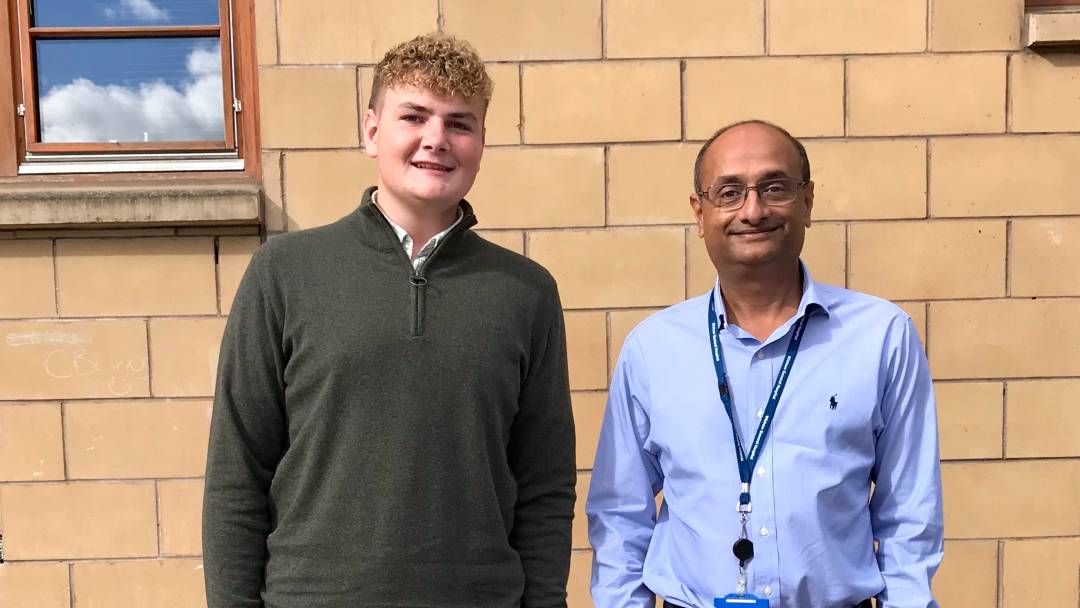Teenager Ross Paterson became the first person in Scotland to get a revolutionary hearing implant after he lost hearing in his right ear.
Ross, 15 from Dunblane, started getting frequent ear infections in 2020 and was referred to an ear, nose and throat (ENT) specialist. It turned out he had a cholesteatoma, which is a pocket of skin growing into the ear that required urgent surgery to avoid complications such as meningitis.
During the operation to get the cholesteatoma skin growth removed, Ross ended up losing his hearing in his right ear aged 13 which can happen rarely in these types of operations.
Ross was then referred from Forth Valley to Mr Arun Iyer, the ENT clinical lead at University Hospital Monklands who specialises in hearing implants.
The standard treatment called a bone-anchored hearing aid is normally used for people with hearing loss associated with problems in their outer or middle ears or for those with profound hearing loss in one ear.
However, Ross was offered a ground-breaking Cochlear Osia system which uses a special type of implant that goes underneath the skin and all you put on top is a magnetic microphone that sends a signal to the piezo-electric implant under the skin that vibrates and creates the vibration through the skull that then passes the sound to his good ear.
The actual implant was carried out in April at University Hospital Monklands and Ross has had some follow up appointments with the audiology team to get the device activated and ensure it is calibrated to Ross’ level of hearing loss and to see how he was healing after the operation.
Arun explains: “For Ross we were able to use the Osia system. It’s a fantastic new piece of technology that can be life-changing for patients as there is less chance of infections or complications and you can simply take the device on or off as you need it so you can’t tell the patient has had anything done.”
Ross recalls the circumstances that led to losing hearing in his right ear and how this new technology has been a game changer.
He said: “My hearing growing up was fine but then I had quite a lot of ear infections. Once I lost the hearing in my right ear after the operation it was a bit of a shock and quite difficult but I just got on with things and tried to stay positive as opposed to trying to change things that can’t be changed and I still had one good ear.
“I was pulling away from social situations as it was difficult to hear my friends and I was getting tired at the end of each day. It’s much better now. I can be in bigger groups and hear conversations really well.
“I like to participate in PE as much as possible, go to the gym, do fencing and I’m in the choir and this device helps me do all these sociable things.
“I can physically feel it under the skin, but you can’t really see it, so it doesn’t really bother me. It was pretty sore the first couple of days after the operation, I needed to wait for the swelling to go down and the scar is healing but I’m now pretty much back to normal everyday life.
“I hope other people who might need it come up and ask me about it. I’d be happy to explain how it works and help other people.”
Arun hopes others will be able to benefit from this technology.
He said: “I’m glad I had the opportunity to perform this operation. It’s a great honour to be able to help this young man to be able to hear and have a normal life which is fantastic.
“It can be debilitating in the classroom and in social circumstances for young people with hearing loss. There is also nothing visible outside the head as the implant goes underneath the skin. Ross can simply take the new technology on and off depending on when he needs it.
“This advancement of technology will be life-changing for a select group of people who are unable to wear a normal hearing aid.
“I’ve done many bone-anchored hearing aids in the traditional way, but this new procedure was different as I had to practise using a dummy. It is slightly challenging but it’s also exciting.
“My aim is to see whether we can help more young people who would be suited to the implant.”
Ross’ parents couldn’t be prouder of their son.
Ross’ dad John said: “Ross has been incredible in dealing with it all and has been really brave.
Ross had to have the initial operation which resulted in hearing loss as we were told the cholesteatoma could perforate his membrane and cause meningitis and we could have lost him. He had to have the operation to remove it or he wouldn’t have survived.
“He was really unlucky to lose his hearing during the operation but this has been a silver lining. It’s amazing technology and a radical new approach.
“We are thankful to Mr Iyer and his wonderful team for what they have been able to do for Ross. Given it was the first of its type, Mr Iyer has totally excelled in terms of our expectations of how it looks and it’s performing well. It’s remarkable how he managed to do it.”

